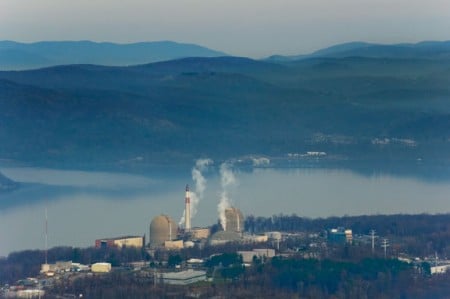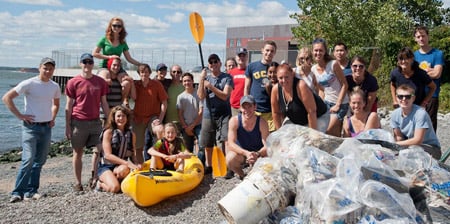Going Big, For Clean Water and Safe Energy

Photo courtesy Giles Ashford
View more images on our Flickr site

Riverkeeper’s fight to protect the magnificent Hudson River and keep New York City’s drinking water safe faced two unprecedented challenges this year: a potentially ruinous plan to bring fracking to New York and the devastating damage to shoreline communities caused by Hurricane Sandy. While there was no shortage of other work, we just knew Riverkeeper needed to “go big” on these two critical issues.
Sandy sent cascades of polluted water flooding down Wall Street, turning the center of the financial universe into a high-rise version of New Orleans’ Lower Ninth Ward after Hurricane Katrina. Riverkeeper joined the response effort immediately, patrolling city waters, testing for pollution and sharing essential information with storm victims and public officials, alike.
Billions in federal “Sandy money” is now on its way to help the tri-state region rebuild. Riverkeeper is fighting for a healthy share of these funds to go to “green engineering” projects like new wetlands, oyster reefs, islands and other natural barriers that can slow future storm surges and steer them to less vulnerable areas. Green engineering also supports a thriving river ecosystem, unlike proposals that would wall off parts of the City and send floodwaters surging into neighboring communities.
Smaller storms leave their mark on our rivers, too. Almost every week, ordinary rainstorms send bacteria levels on the Hudson sky-high. A quarter of all water samples taken by Riverkeeper since 2006 exceed federal guidelines, because of overflows from leaky sewers and aging water treatment plants. Results from Riverkeeper’s sampling program – the largest in the state – drove passage of the only new environmental law enacted in New York in 2012: the “Sewage Pollution Right to Know Act.” Starting in the Spring, this new law will require New York municipalities to notify their citizens whenever their waterways are fouled by pollution from faulty wastewater treatment or storm-related overflows.
Riverkeeper heard warnings that telling the public about pollution might drive them away from the river, but we knew that folks on the Hudson wouldn’t run for higher ground when they learned the truth. What happened instead is inspiring: eight different local groups formed to join our water quality sampling program, helping us to double the size of the program. Local water warriors have convinced a growing number of towns to start re-investing in water quality, cutting pollution and improving quality of life. In May, as many as a thousand volunteers will assemble for the “Riverkeeper Sweep,” which has become the region’s biggest shoreline cleanup event in just its second year.
2012 will go down in history as the year New York’s green movement returned to its roots, especially when it comes to fracking. Tens of thousands of people, many of whom had never protested anything in their lives, got loud about fracking’s documented risks to water, air and community health, demanding that government look elsewhere for new energy. Riverkeeper was right in the middle of this fight, now universally recognized as the biggest, most effective advocacy campaign ever mounted in New York environmental history.
The result of all this grassroots mojo: fracking is on hold in New York, pending further health studies. This amazing turn of events proves that informed, participatory democracy is alive and well in New York. It gives us hope that we can catch some of the same magic to solve our other critical environmental problems, too.
In the end, the best thing about the current hold on fracking may be that it opens the door for New York to choose safer, saner energy sources. Riverkeeper’s doing everything possible to help make that happen, like publishing an influential new study proving that renewables, new transmission lines and energy efficiency can free us from fracking, close the Indian Point nuclear plant, cut carbon pollution and put people to work – all for around ten dollars a year
per household.
Riverkeeper’s 50th anniversary is in 2016 — only three years away. Count on us to “go big” over these next three years. The battle for clean water and safe, sustainable energy is on, and we mean to win.
